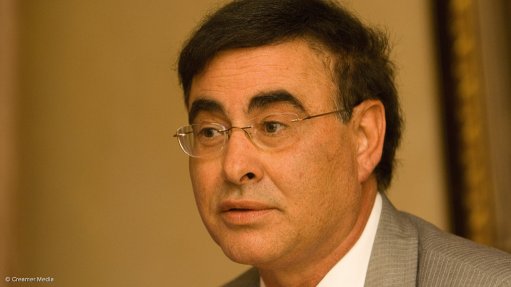
ASHER BOHBOT
EOH’s corporate goals were originally aspirations, but the company is relevant and is making a difference in the territories it operates in
Photo by: Duane Daws
As South African information technology (IT) firm EOH posted another full year of strong growth, CEO Asher Bohbot, known for his frank words, peoplecentric management style and stoic humanism, attributed the company’s continued South African and African growth to leveraging of its internal expertise and its skilled employees.
“I am not less amazed than you by the stuff that we do. I also sat here watching the same presentations by the division heads and I thank them for their good presentations,” he said to a hall full of investors at the company’s September presentation of its July 31, 2015, full-year results.
In attempting to explain the EOH of today, with a market capitalisation of R21-billion, Bohbot noted that the firm had, similar to other IT companies, started with basic offerings of infrastructure services, hardware and software, and implementation, but, as it grew, it continued to add its newer capabilities to its existing services and solutions to develop increasingly holistic solutions for clients.
“We take the challenges and issues of society and of the economy, because they affect us as individuals and families and citizens, and try to find solutions, even if demand does not exist at that moment. We take our skills and knowledge and our intellectual property and our engineers and technology and build a solution that we can take to customers.”
Specifically, Bohbot notes that EOH’s services are in demand throughout Africa, including in government organisations where enabling better service provision will enable the private sector to function more effectively and drive growth on the continent.
“When we originally wrote our corporate goals – to provide technology, knowledge, skills and organisational ability critical to Africa’s development and growth and be an ethical, relevant force for good and to play a positive role in our society, beyond normal business practice – they looked a bit fluffy to many people.
“They may have been an aspiration then, but we are relevant, and making a difference is our purpose. How we do this is by capitalising on individuals’ abilities and drive to fulfil their aspirations. We capitalise on letting people do their thing, if they are qualified to do this.”
The leadership of the business only controls and ensures that the people the firm has are the best people and, once you have the best people, by definition, you should leave them alone, he added.
“Though it does help having available a strong balance sheet and brand that gives them access to customers,” admitted Bohbot.
Take the creativity and entrepreneurship of people and take the size and muscle of a corporation and combine them without destroying each other, said Bohbot.
“Then the challenge is how to organise and structure a reward system and the coordination and customer interactions, which we work on constantly in EOH.”
Further, Bohbot said that the firm’s prospects were good and it was excited about Africa. Its approach would remain cautious, but it continued to acquire businesses and could be considered successful, he noted wryly.
“There is a lot of business to be done in Africa and in our own sphere. We need to get the governments working – infrastructure, education, banking, retail, roads and bridges. Fortunately, there is enough investment and goodwill and we are joining this and bringing what we can.”
EOH invests 6% of its profits after tax in its skills development and job creation initiatives and urges other firms to support skills development, workplace experience and job creation initiatives in the countries where they operate.
The firm posted revenue growth of 35% to R9.734-billion, from R7.22-billion, and growth in profits after tax of 41% to R692-million, from R492-million, for the year ended July 31.
It also grew its headline earnings per share by 29% to 575c, declared a dividend of 150c a share, which was 25% higher than the prior year, and increased its cash to R1.664-billion to fund growth and acquisitions. Its effective tax rate was 27%, said EOH financial director John King.
The company reported 56% organic growth, with the remainder arising from its acquisitions in Africa and locally. It grew its staff complement from 9 000 to 10 000 over the past year, serving its 2 000 large customers and government institutions in the 34 African countries it operates in.
EOH would continue with its strategy to consolidate and complement its existing services with strategic acquisitions, the management team concluded in its financial results release.